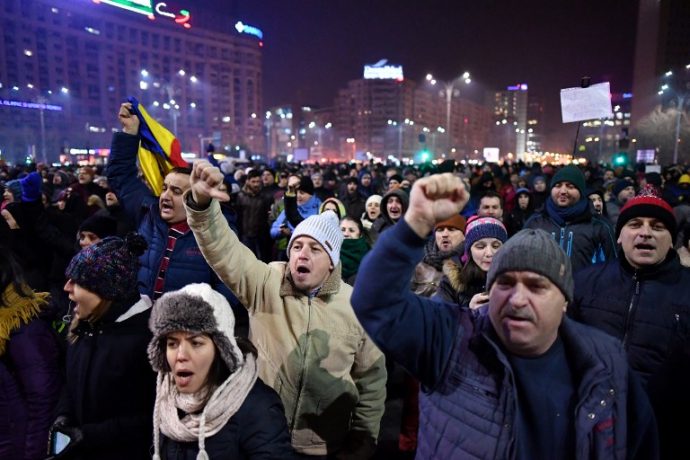
by Mihaela Rodina and Anca Teodorescu
Agence France-Presse
BUCHAREST, Romania (AFP) – Romania’s prime minister insisted Thursday that the government will press ahead with decrees decriminalising certain corruption offences, defying the country’s biggest protests since the end of communism.
“We took a decision in the government and we are going to press ahead,” Sorin Grindeanu said after a meeting in Bucharest of his ruling left-wing Social Democrats (PSD).
In the largest demonstrations since the fall of dictator Nicolae Ceausescu in 1989, as many as 300,000 people, according to media reports, thronged the streets of Bucharest and other cities overnight, many shouting “Thieves!” and “Resign!”
This came after the government issued an emergency decree late Tuesday decriminalising certain corruption offences and making abuse of power punishable by jail only if the sums involved exceed 44,000 euros ($47,500).
In the capital, a small group of football hooligans hurled bottles and firecrackers at police, who responded with tear gas, according to the authorities.
Twenty people were taken into custody and five people including two police officers were hurt.
The government has said it is merely bringing legislation into line with the constitution.
But critics say the principal person to gain will be PSD leader Liviu Dragnea, 54, currently on trial for alleged abuse of power involving 24,000 euros and who already barred from office for a previous conviction for voter fraud.
But Dragnea on Thursday denied that he would benefit, hitting out at a “campaign of lies and disinformation” and blaming President Klaus Iohannis of being the “moral author of last night’s violence”.
“I talked to my lawyers. The decree does not put an end to my trial. The false accusation against me remains in place,” Dragnea told reporters.
Another initiative, which Grindeanu will submit to parliament, will see around 2,500 people serving sentences of less than five years released.
The government said that this will reduce prison overcrowding but critics say that the main beneficiaries will be the many officials and politicians ensnared in a major anti-corruption drive of recent years.
Romanians, especially the young and the middle class, hit the streets “the moment they got the impression that justice and this fight against corruption were in danger,” political scientist Radu Magdin told AFP.
Prosecutors are currently investigating 2,150 cases of alleged abuse of power. In 2015, 27 senior officials went on trial including then-premier Victor Ponta, five ministers and 16 lawmakers — many of them from the left.
‘Deep concern’
Only last week the European Commission commended the efforts on graft by ex-communist Romania, which joined the European Union together with neighbouring Bulgaria in 2007 as the bloc’s two poorest members.
But this week’s latest move set off alarm bells in Brussels, with European Commission head Jean-Claude Juncker and his deputy Frans Timmermans expressing their “deep concern” and warning against “backtracking”.
The PSD bounced back into power in elections on December 11, barely a year after major protests over a deadly nightclub fire blamed on corruption forced it from office.
In the election, Dragnea turned attention away from graft by vowing to jumpstart the economy, promises which went down well in a country where one in four people lives in poverty.
In fact on Wednesday a raft of economic measures came into effect that hike the minimum wage and pensions, and give students more grant money and free travel on public transport.
But Malin Bot, editorialist in the centre-right Romania Libera daily, said that this “counts for nothing”.
“Their only aim is to protect themselves from justice and keep hold of their ill-gotten fortunes,” he wrote.
“It was time that people woke up and stopped accepting all this abuse,” Daniela Crangus, 31, a computer expert, told AFP at Wednesday’s demonstration.
Centre-right President Iohannis, who is seeking to get the constitutional court to annul the decrees, said Thursday he was “impressed” by the protests.
Romanians “have shown clearly what they want: the rule of law,” Iohannis said.








